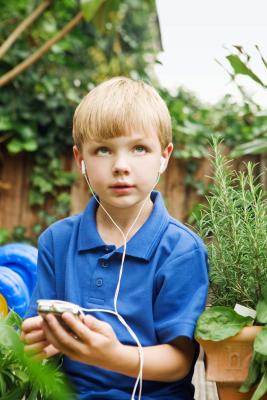A child does not have to be totally deaf to be hearing impaired, although deafness is certainly a hearing impairment. Hearing difficulties can vary from a partial to a complete hearing loss and from permanent damage to a correctable condition. Some children are born with hearing damage and others develop the loss later, perhaps by overexposure to loud noise.
Hearing Loss
A child can suffer from hearing loss when she has a problem with her ears or if her ears are damaged. If your child was born with a hearing loss, she has a congenital loss. This is the most common birth defect. If she loses her hearing during childhood, she has an acquired loss, which can happen suddenly or gradually.
Types
The two types of hearing impairment refer to which part of the ear is affected. If the problem lies with the outer or middle ear, such as a blockage or a structural problem, your child won’t hear sound properly. In many cases, doctors can treat this condition, called conductive hearing loss, with medications or surgery, according to the World Health Organization. If the problem lies with the inner ear or with the auditory nerve, your child will have trouble hearing sound and understanding speech. This type of loss, called sensorineural hearing loss, is usually permanent. Doctors may be able to treat sensorineural hearing loss with hearing aids or with a cochlear implant, according to KidsHealth.
Causes of Conductive Loss
An ear infection, called otitis media, is the most common cause of conductive hearing loss. A buildup of fluid and/or pus behind the eardrum can block sound, causing your child to have difficulty hearing for weeks and sometimes months. But after the infection clears up, your child should be able to hear normally again. Wax buildup or other types of blockages can also cause a temporary hearing problem. Conductive hearing loss can also occur from putting a hole in the eardrum, perhaps from sticking a cotton swab too far in the ear. A sudden loud noise, repeated ear infections or a head injury can also damage the ear, causing hearing loss.
Causes of Sensorineural Loss
Sensorineural loss can occur for many reasons. Your child may have inherited the disorder, suffered a skull fracture or acquired the hearing loss from an infection you had during pregnancy, according to the World Health Organization. The inner ear can also suffer damage from repeated ear infections, measles, mumps, chickenpox and brain tumors. Some medications or chemotherapy drugs can cause hearing loss. Constant exposure to loud noise can cause permanent damage to the inner ear, as can a sudden loud noise.
Hearing Tests
Take your baby to the doctor for a hearing test if he doesn’t respond to your voice or to loud noises. Have your older child take a hearing test if he tells you that he can only hear parts of conversations; he often asks people to repeat themselves; he often has to ask his friends what the teacher said; or, if he plays the TV too loudly. The doctor or an audiologist can detect the problem.
Prevention
The World Health Organization offers this advice to help prevent your child from sensorineural hearing impairment: Immunize her for measles, mumps, rubella and meningitis; get yourself immunized for rubella, and treat syphilis and other infections before you get pregnant. It further advises parents to treat a jaundiced baby because jaundice can damage a newborn’s hearing nerve. Finally, teach your child not to listen to her personal music player too loudly. According to KidsHealth, music players are the number one culprit for noise-induced hearing loss in kids.





